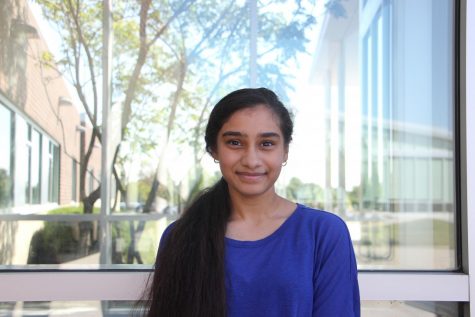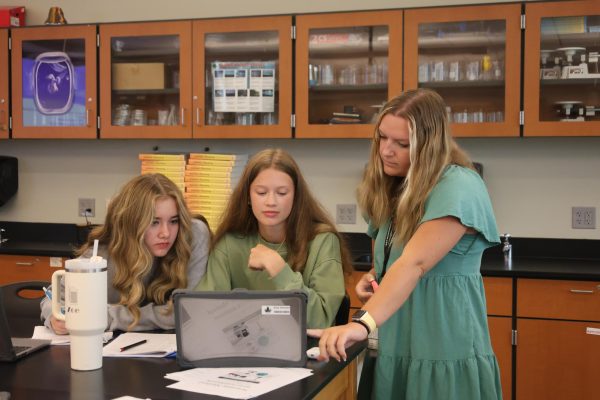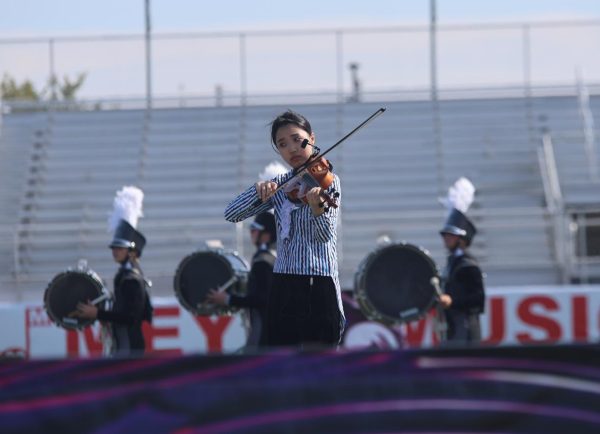Language without borders: students talk about different languages used at home
In a country where many cultures are mixed, students tend to focus on the culture and language spoken by a majority and distance themselves from their own culture. However, some students are taking an interest in connecting to different cultures by taking world language classes and sometimes connecting back to their family roots.
Junior Lianna Shoikhet said she has Ukrainian ties on both sides of her family. She said she has been speaking Russian since she was young, but noticed she was forgetting the language as she started socializing more.
“As I started to go to school and as I started to speak English more around the house, I noticed that I was forgetting a little bit,” Shoikhet said. “You improve your language with practice, and I just wasn’t practicing as much.”
To combat her forgetfulness, Shoikhet said she would watch Russian soap operas, news and cartoons. She also relearned how to read and write Russian with her parents’ help. Now, she said she reads Russian at an eighth-grade level.
When Shoikhet was younger, she would spend time with her grandparents, whom she primarily spoke Russian with. They would teach her everything in Russian. When she started kindergarten, she said she encountered some difficulty.
“It was really hard for me to adjust from Russian to English because I was learning my ABCs in Russian and it was just difficult to learn,” Shoikhet said.
After finally understanding both languages thoroughly, Shoikhet said sentence structure is practically the same. Differences include is the length of the alphabet, the accents and the sounds. For example, in Russian, there’s something called hard accents and soft accents.
Shoikhet said she wishes to continue learning and studying Russian in college, but she said finding an opportunity to do so might be difficult.
“It’s not like Spanish or French — it’s not very popular — or even Chinese,” Shoikhet said. “It’s not a common language to be studying in college.”
Knowing her mom has been in a class to learn Russian in college, Shoikhet said there might be a few programs out there, but they are almost nonexistent.
Along with Russian, Shoikhet can fluently speak English and French as well as a little bit of Ukrainian and Armenian.
Similar to Shoikhet, senior Megan Garcia learned Spanish from a young age. Her dad immigrated from Colombia and her mom learned Spanish in college.
“My grandmother on [my dad’s] side took care of me when I was very young,” Garcia said. “I actually started learning Spanish at a very young age.”
Unlike Shoikhet, Garcia did not experience any difficulty when it came to school, primarily because Spanish is taught at schools and is similar to English. Garcia said she’s been taking Spanish in school since kindergarten. She said once she starts speaking in Spanish, it is just much easier for her to stay in it. She also said she has an advantage when compared to other students in her AP Spanish 5 class. She said she loves helping her friends with
pronunciation and vocabulary.
“I can learn a new word and, like, I’ll remember it … because that comes with being a natural speaker,” Garcia said.
At home, Garcia speaks English with her mom and sister, but practices Spanish with her dad.
“I like to just speak to my dad and we like to listen to salsa and bachata [music],” Garcia said.
Along with listening to music, Garcia also watches European soccer games in Spanish with her dad. She said she was once obsessed with watching telenovelas because she found them entertaining. Now, she watches Spanish movies, TV shows and HBO Latino.
When Garcia recently visited Mexico, she said she used the moment to practice her Spanish. She said she would often communicate with cab drivers and other locals.
“I would start speaking and, a lot of people are shocked […] because I do look very Caucasian,” Garcia said.
The locals would exclaim that she sounded like a native, and Garcia said she considers Spanish as her second language. In many other social situations, she said Spanish helped her communicate with others and tear down a cultural wall.
“I’ve learned to appreciate being able to communicate with people I wouldn’t normally be able to,” Garcia said.
Garcia has worked jobs when speaking Spanish became helpful. It would not only give her the advantage to get hired but also help make other people’s days better.
“I used to work at Starbucks, if they’d come up and they’re trying [and] they’re struggling and I can speak their language you know, that helps tremendously with connections,” Garcia said.
Mandarin teacher Miko Wu said learning a foreign language can help people adapt to new situations because they’re immersing themselves in a new culture. Learning a new language can also open paths that would not have been seen before.
“I think it definitely broadens your horizons and also gives you a lot more opportunities,” Wu said.
Without learning English, Wu said she would’ve never thought to study abroad in the U.S. and soon end up teaching. She has been learning English ever since elementary school, but spoke Mandarin at home.
Along with English and Mandarin, Wu said she learned some Spanish and Japanese in college. Her incentive to take these classes was because of their popularity, but she said she quickly began to enjoy the classes.
“You have a sense of achievement [when] you can really talk to someone in another language,” Wu said.
Wu said it’s very important to learn another language, especially if the language connects back to one’s family background.
“I think it can keep your heritage, even though you’re American, but you still have your own culture,” Wu said.
“It’s your own identity, and it’s what makes them different from others. I think for sure you need to keep your own culture.”












